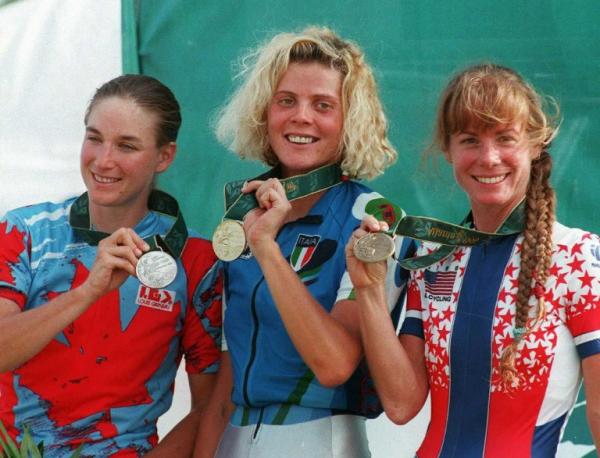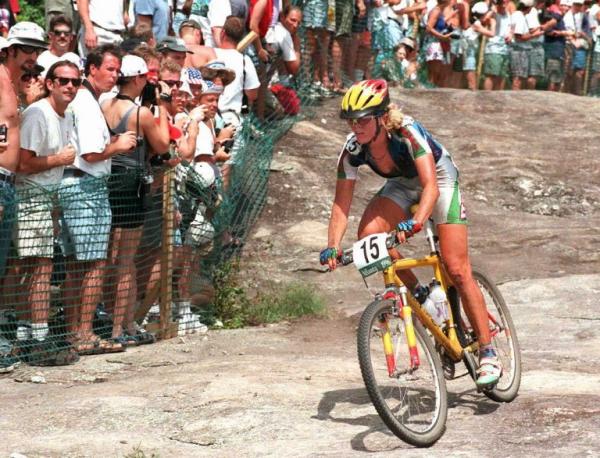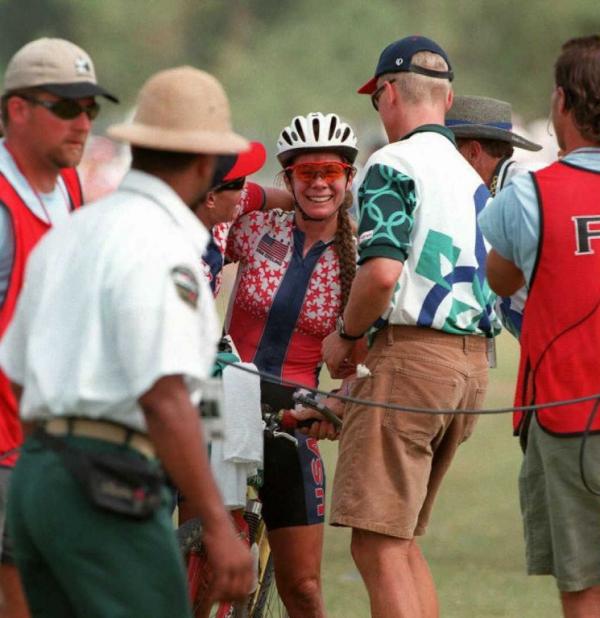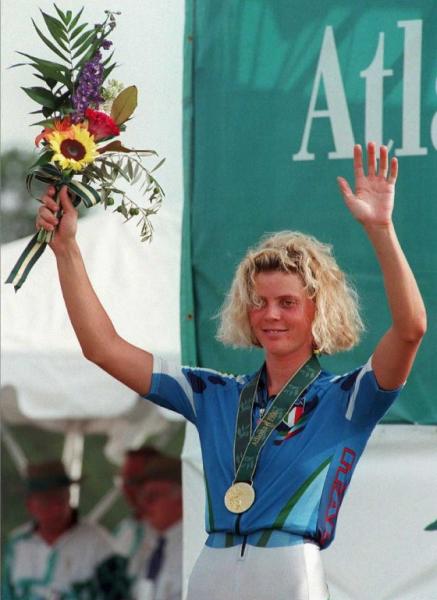Olympic Moments: 1996 - Mountain biking comes of age
Part 2: DeMattei wins bronze medal in front of "home" crowd




In part one of this feature, Cyclingnews took a look back at the men's mountain bike race at the Olympic Games in 1996, the first year the cycling discipline was included in the Olympics. In this part two, the spotlight shifts to the women's mountain bike race.
Olympic Moments: 1992 - Boardman wins in Barcelona
Olympic Moments: 1948 - Godwin realises his dream
Olympic Moments: Indurain's last hurrah in Atlanta 1996
Olympic Moments: 1984 - Grewal edges Bauer in thriller
Olympic Moments: 1996 - Mountain biking comes of age
McConnell, Henderson selected for Australian Olympic mountain bike team
Twenty-nine women lined up in at the Georgia International Horse Park in Conyers, Georgia on that summer day for the 2:30 pm start of the three-lap, 19.8-mile race. It was 91 degrees (Fahrenheit) and humidity was at 46 percent.
Mountain biking's golden girl, Paola Pezzo (Italy) was certainly one of the favorites, and she went on to win gold in a time of 1:50:51. Canada's Alison Sydor, another star, took home silver in a time of 1:52:36. Not far behind her was Susan DeMattei, who won bronze for the United States.
Winning Olympic gold was the beginning of the era Pezzo would dominate. From that special day in 1996 until the end of the 1997 season, Pezzo won every race she started. Admired for both her results and her beauty, she accumulated fans around the globe.
Juli Furtado, who had dominated the sport before Pezzo, was also on the start line, but it wasn't to be her day to win a medal. Instead, DeMattei, another accomplished American racer, would bring home hardware for the US. From 1990 through 1996, DeMattei had made the top three in all but one of the national series. She also won silver at the 1994 world championship in Vail, Colorado.
"I was excited to start the race. I knew all the people I was racing with," said DeMattei to Cyclingnews. "It was Juli Furtado and me for the US. Juli had great sense of humor and like to keep things light. I was 33 and felt like one of the old ladies out there, even though now, in retrospect, it's not that old."
Being the higher ranked rider, Furtado started nearer to the front, and DeMattei was one of the last people lined up.
Get The Leadout Newsletter
The latest race content, interviews, features, reviews and expert buying guides, direct to your inbox!
Despite being on the start line of the Olympics in her home nation, DeMattei didn't feel pressure. "It didn't weigh on me at all. I wasn't nervous. I slept great the night before and felt good. We had gotten lumped in with the road racers that year. We were housed on this amazing property that some Atlanta resident had donated to the USA Cycling racers. We had this compound and thanks to Lance (Armstrong) and his entourage, we had a chef there. It was unreal. We were the dirtbag mountain bikers and were feeling spoiled."
Detained by a small crash just in front of her at the start, DeMattei remained calm and got around it. She had to work hard on the first lap to catch up. "That's when I knew (it would be a good day) - after that first lap catching up easily - I was psyched. I felt really good."
Pezzo escaped on the second lap. She rode away from both Sydor and DeMattei and was not seen again for the duration as she soloed to the win.
Then Sydor rode away from DeMattei. "She was a super good technical rider, and I was poor at best with the technical riding. She had an engine and was a beautiful rider. I watched her go, and I was still pleased."
On the last lap, DeMattei fought hard to get the bronze. She was challenged by Gunn-Rita Dahle (Norway), who was racing her first Olympic Games. The Cyclingnews blogger is still competing today and hoping to medal at the London Olympic Games in August.
"It was so cool to see Gunn-Rita back when she started. That might have been her first year," said DeMattei.
"On the final lap, she and I were riding together, and I could not sprint my way out of a paper bag if I had to. I was afraid I'd have to sprint her at the finish line. I was wondering what I would do."
"Suddenly I never saw her, so I must have done the same thing to her as the others did to me... ridden away. With a half lap to go, I realized I was in third and might keep it. I don't think my legs have ever cramped before in a race, but there were steep and nasty climbs at the end, and my legs were cramping. I kept thinking I just had to get through it. I did. I stayed steady and came through and was third."
DeMattei was "out of my skull with happiness" upon winning the bronze medal. Along with several family members, Dave Wiens, now her husband and many-time Leadville 100 winner, was on hand waiting for her. "Paola and Allison deserved their placings and did awesome. I felt a little patriotic being from the US in that event and being able to bring a medal home. Taking part was the cool thing. Everything leading up to it was such an exciting time for mountain biking. We were being recognized as a legitimate sport. We had felt like the red headed stepchild compared to road racing. This gave us a feeling of worthiness."
Furtado would finish 10th, a surprise to some who had expected her to do better. "I was definitely the underdog and wasn't expected to do what Julie could have / would have / should have," said DeMattei, who noted that was about the time Juli was starting to show the signs of Lyme disease, which she was eventually diagnosed with.
"Juli was and is so amazing. She was not on her game - no one could touch her when she was on her game, which was 99.9% of the time. The hardest part of the Olympics for me was having her not be able to do what she normally did. Anyone who had been around her racing the five years prior would have said she would have kicked my ass that day, but what happened happened. She was a good sport about it. She was excited to be at the Olympics and kept a good attitude about it. I still admire her for it."
About the course
The relatively shorter than typical laps for that time proved to be a precursor for what would come in the future of elite cross country racing. Between the limited space of the venue and the TV broadcasting of the event, organizers went with a 6.6-mile lap.
"You can put fast riders on any course and the fastest riders will do well," said DeMattei. "Given what they had, they did such an amazing job with a piece of terrain that was never intended for mountain biking. There were no long climbs then. That was more what we liked, but there were lots of rolling sections and the famous rock section."
"It was taxing to ride because it was such an uneven surface. Trying to go fast, it was hard. They had a few river crossings and steep uphills and downhills."
"There were no dangerous sections, which was nice because I don't like getting off my bike if I don't have to. There was lots of power riding - you weren't always in the same gear for several minutes. It was exciting to ride and to watch with so many twists and turns. It was circuitously routed with a variety of stuff to contend with."
A look back at DeMattei's Bike
DeMattei was racing with clipless pedals, but noted that she had not been doing so for that long at the time. She was onboard a Titanium hardtail Diamondback race bike with a Manitou shock up front. It had the original kind of GripShift and bar ends and V-brakes.
"There was nothing fancy about it. I'm not a weight person," she said.
There were no tubeless tires at the time - just 26-inch wheels with tubes. "I always had way too much pressure in my tires because I was afraid of flatting. There were no aid stations. I had a seat bag with my CO2 cartridges and tools in case I had a mechanical problem."
The contenders
Gold medal winner Pezzo went on to her string of success through the end of 1997, including the world championships. There was an alleged doping positive in 1997, but she was officially cleared in January of 1998. In 2000, she won another Olympic gold in Sydney, Australia.
Sydor also had a long, stellar career including three cross country world championship titles (1994 - 1996), four silver and two bronze cross country Worlds medals. She narrowly missed two more Olympic medals, finishing fifth in 2000 and fourth in 2004.
DeMattei called time on her racing career and retired after the 1996 Olympics.
Fourth place finisher Gunn-Rita Dahle is still racing although she took a year off to have a baby. She just won her first post-baby World Cup in La Bresse in May 2012 and clinched the European Championships earlier this June.
A lasting effect
Becoming part of the Olympic Games was a big deal for mountain biking. "When it was announced that mountain biking would be in the Olympics - sometime early or mid-1995, that blew up the sport in a positive way," said DeMattei.
"There was lots of sponsorship. The mountain bike companies were growing. It was new and everyone was still buying their bikes although plenty of people still didn't know much about the sport and would ask me if we'd be on dirt or pavement."
Sixteen years later, everyone still knows what a mountain bike is. There's been a generation of mountain bikers born and grown. "When I was 18, mountain bikers were just coming out. Kids are getting into it right away on a mountain bike. It will be amazing to watch the current kids grow up doing it," said DeMattei. "I hope everyone is excited for the Olympics again this year."
Read part 1 of this feature on the elite men's race.
Sue George is an editor at Cyclingnews. She coordinates all of the site's mountain bike race coverage and assists with the road, 'cross and track coverage.